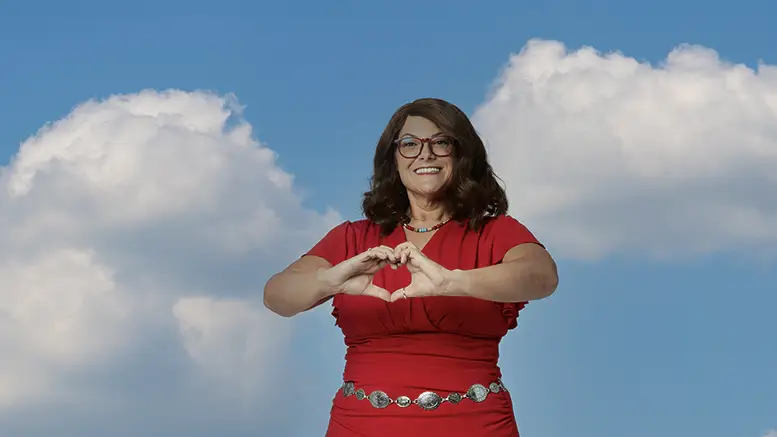Molly McGuire’s pregnancy went downhill fast in her third trimester. Serious complications claimed her baby’s life and almost killed her, too. She wants others to push for the care they deserve.
By Tim Harms, AHA—
SELMA, IN—An east central Indiana woman is 1 of 12 women selected nationally to represent the American Heart Association’s Go Red for Women movement across the country in 2025.
Molly McGuire of Selma is part of the Association’s 2025 Class of Survivors that will share how their lives have been impacted by heart disease and stroke.
At 30, Molly felt her biological clock ticking. She had reunited with her high school sweetheart, and they both wanted a baby. With the help of fertility medicine, the couple was soon expecting. Although there were some early hiccups, Molly felt healthy.
Then came the third trimester.
“Things started to go downhill fast,” Molly said.
At 33 weeks pregnant, she noticed a lot of swelling. In a Christmas family photo, Molly’s eyes were so swollen it looked as if a bee had stung her.
Molly also had a headache and called the doctor; she was told her swelling was normal in her condition. She felt she was being put off until after the holidays.
Molly combed through pregnancy books, researching her symptoms. She called the doctor again, even mentioning the possibility of preeclampsia. The pregnancy complication, marked by high blood pressure, protein in urine and sometimes swelling, can lead to serious, and even fatal results for both mother and baby. Molly was told she probably had the flu, which was going around.
One night, Molly developed a headache so severe that she couldn’t stop vomiting. She called the doctor again, reported a sudden pain on her right side and said she hadn’t been able to feel her baby move.
“They’re like, ‘You’re bigger. The baby’s bigger. There’s not a lot of room there anymore. Big babies don’t move a lot,’” said Molly, who was overweight at the start of her pregnancy.
Eventually, she got an appointment. The health care team didn’t swab her for the flu or check the fetal heart rate, but they checked her blood pressure and drew a blood sample.
Molly’s gut told her things weren’t normal. As she was leaving her appointment, she saw the hospital emergency room next door, but instead of seeking additional help, she decided to go home, lie down and prop her legs up as she had been told.
The next morning, she went to work and also attended a class on gestational diabetes, which she had developed while pregnant. The instructor listed 10 signs and symptoms of major concern during any pregnancy.
“I just burst into tears, and I cried out ‘I have all 10 of those right now,’” Molly said. “And then I told her, ‘I have not felt my baby move in days.’”
The instructor and another woman hooked Molly up to a fetal heart rate monitor.
A doctor at the hospital where the class was held performed an ultrasound and told Molly her baby had no heartbeat. He called Molly’s obstetrician and said the baby had died and that Molly’s blood pressure was at stroke level. Molly wondered why she hadn’t gotten a second opinion.
The couple was told to go to the obstetrician’s office. When they were called back to a room, Molly saw the words “fetal demise” in big letters on her chart. The results of the bloodwork were in: Molly had severe preeclampsia. In fact, Molly’s condition had morphed into HELLP syndrome, a life-threatening pregnancy complication involving destruction of red blood cells, elevated liver enzymes and low platelet count. She needed to be hospitalized immediately to deliver the baby she had named Michael.
Doctors told Molly’s family she probably wouldn’t make it that day in January 2009. The doctor who delivered the devastating news about Michael later told Molly that he didn’t expect to see her again. He said she was so close to having a stroke or seizure that, if she survived, she could live out her days in a nursing home.
“I’m lucky I’m alive today,” Molly said. “I don’t think I had horrible medical providers, but I think they made some horrible decisions regarding my care, and I hope they learned.”
Molly, now 46, and her then-partner went on to have two daughters, who are now teenagers. She shares her story in hopes that others take charge of their health.
“I knew something was wrong, but my concerns were not heard,” she said. “You know your body best. Advocate for yourself and don’t be afraid to get a second or even third opinion.”



